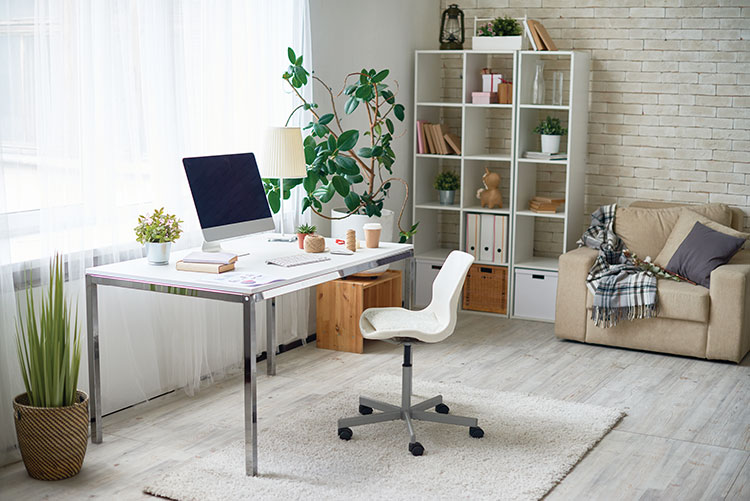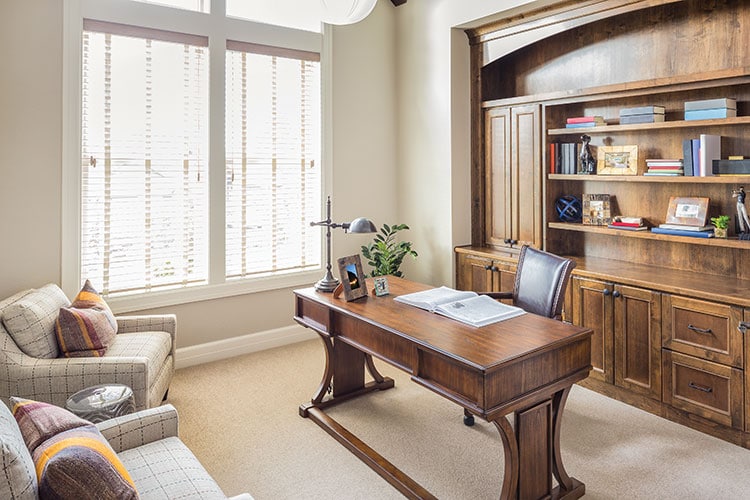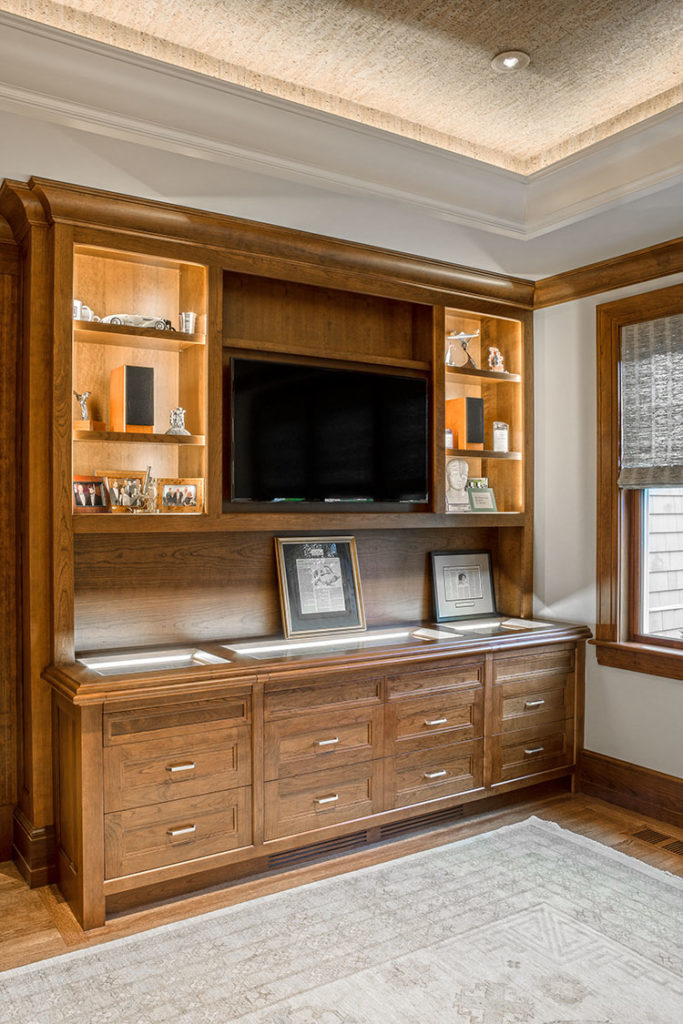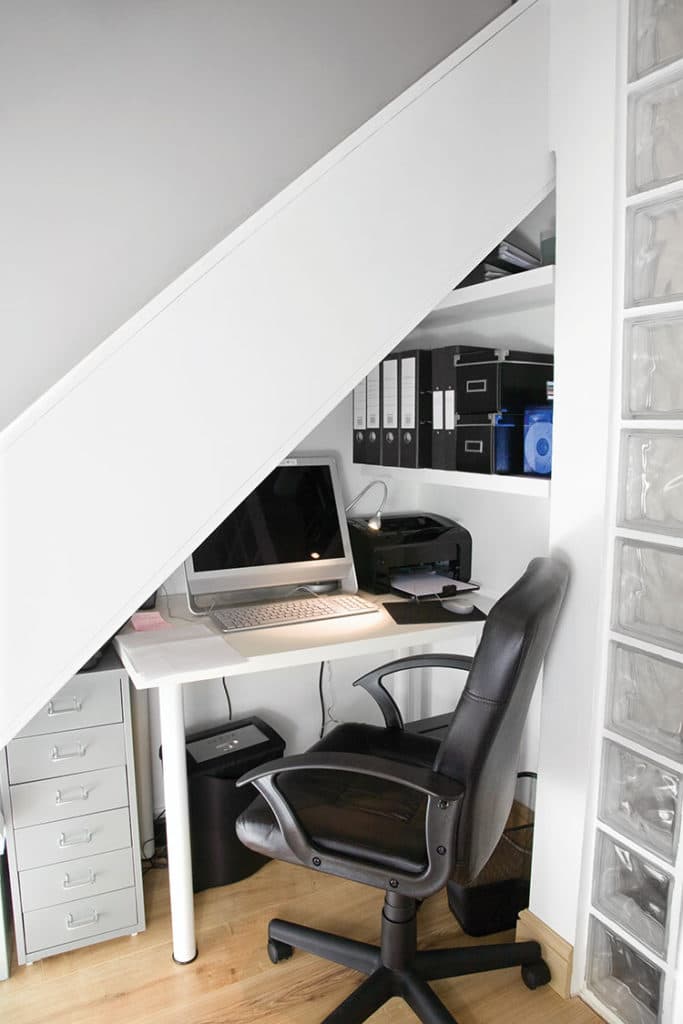
Work/ Life Balance
Cape Cod Home / Early Summer 2020 / Home, Garden & Design
Writer: Julie Craven Wagner
Work/ Life Balance

Cape Cod Home / Early Summer 2020 / Home, Garden & Design
Writer: Julie Craven Wagner
As we find ourselves working from home, how do we really get the job done?

Someday, as we look back at the spring of ’20, we will acknowledge a shift in the way we valiantly tried to maintain productivity. Circumstances completely out of our control have forced us to retreat into our homes where we are struggling to conduct business as usual. Families with young children suddenly find themselves conducting classroom activities, while parents of adult children are evaluating their bandwidth capabilities, and everyone is striving to achieve more calm than chaos. With such a sudden and unplanned shift in how we work and how we live, how do we successfully run our businesses, while maintaining our home environment?
Peter Kimball, owner of A.P. Kimball Construction in Yarmouth Port says that homeowners across the Cape are struggling to figure out the best way to work from home. “Just assuming that you can sit on your couch with a laptop and cell phone and do your job isn’t working for anyone,” Kimball explains. “Not going to an office everyday means that you really have to define your place of business at home.” For over a month, Kimball has been responding to calls from both new and existing clients who are looking to either make quick changes to their home to allow their families to be more productive, or in some cases, define a long-term solution that will permanently and significantly change the space in their home to become a dedicated work environment.

Kimball says that the most important thing for a space to be effective is to make sure it is isolated, or at the very least, defined. “The ideal situation is a dedicated space in the home that is reserved for work. But it doesn’t have to be a large space. If people don’t have a whole room to turn over as a home office, a portion of a bedroom can easily become a space that provides the focus and functionality people are looking for,” Kimball says when looking at the use of a guest room or other room in the home. “And, it doesn’t have to be a complete room. If you still need a place for weekend guests, you might consider converting a guest room and having some of your furniture like a desk or cabinets built-in. That way, the space is customized to exactly how you need and want to use it.”
One point of caution he emphasizes is not to assume that your basement, particularly an unfinished one, will suit your needs. “Nobody really wants to go to work, but it is obviously necessary,” he says. “You want to have a space that you feel good about entering; one that is comfortable and conducive to work. You can’t just set up a table in your basement and expect to be productive. Things like proper lighting, ventilation and climate are real considerations.”

Kimball says that he and his team are creating workspaces for clients in lower levels that have sufficient natural light and fresh air as well as heating and cooling solutions that are incorporated within the rest of the home. “A lower level can become a great work space. And, because of the possible square footage, it could become a perfect space for multiple members of the family,” Kimball notes. An efficient construction project might involve creating space for school activities for younger children and more traditional work solutions for the adults that often includes college-aged children, parents and even grandparents.
Doug Frye, owner of Topaz Engineering Supply in Hingham says that he has many clients who use live format printers in their home offices. Electrical engineers, architect and designers all depend on this equipment to functionally do their jobs, so why not have the equipment in a home office? Frye says, “There are options that suit a residential space without compromising performance. And, some of the models are quite cost-effective in comparison with a printer/copier/scanner you might get at a big box store.”

Brad Smith, president of Audio Visual Designs in Westwood, says that his clients, including countless homes on the Cape as well as both islands, have a certain expectation of how responsive their broadband and other technology should perform, regardless of whether they are working from their home or a traditional office. “Many of our clients run businesses that are successful primarily because of their ability to respond,” Smith says. “So, when they are at their vacation home, or they are forced to work from any home environment, they need high-speed internet, with security as well as flexibility.” Smith says the public’s recent embrace of video-conferencing for both work and casual use has upped the ante for the kinds of screens, bandwidth, integration and performance clients are seeking.
“This current scenario has afforded clients a perfect opportunity to schedule installations, upgrades or maintenance in the second homes that they might have been putting off,” Smith suggests. “We have crews that are working on Martha’s Vineyard and Nantucket as well as on the Cape, and we obviously have protocols in place to ensure everyone’s safety—the homeowners as well as the employees.”
Smith also notes that isolation is an important factor for most people trying to run their business in a home environment. “It is not realistic in the long term to expect to work at your kitchen counter with distractions from family members including children and pets,” he says. “It is very possible this new way of working may be changing the way we do business in certain parts of society. At the very minimum, people should be prepared to have a plan that works for them and allows them to accomplish what they need to without additional aggravation.” Smith also cites the extra effort that goes into a customized network would allow a guest network to be set-up for visitors as well as children, allowing the business to be independent of the taxing effect of casual internet use.

Karl Ivester, owner of New England Shutter Mills, has had a recent idea for an at-home work solution that he has been discussing with Smith. Ivester, with locations in Lawrence and Harwich, manufactures architecturally correct and functional wooden shutters, and therefore is no stranger to construction and fabrication. Ivester and Smith have discussed a potential temporary mobile office that would be delivered to a homeowner and parked on their property—Ivester refers to it as an Express Executive Suite.
“It would provide a turn-key solution for those that need to have a dedicated work space that doesn’t suffer from the distractions in the house,” Ivester explains. Smith goes on to say, “The options for technology can range from connecting to the existing broadband in the home to dedicated service that would be ordered, allowing secure networks to access things like virtual private networks.” While originally conceived for business owners who needed a place to work while on vacation, Ivester now sees the application to be valuable for the entire family and is considering additional sizes that would provide a workspace for a couple of people.

Until now, a well-appointed home office might have been considered a luxury. But the times, they certainly are changing, and luxuries have been known to become necessities. Angela Kimball, the other half of A.P. Kimball considers the company fortunate to have been able to bring some homeowners’ dreams to life. “We completed a home office for a very special homeowner who had an incredible second story view overlooking miles of Buzzards Bay,” Kimball recalls. “They wanted to be able to take advantage of that view and the husband was a business professional. He asked us to convert the space into an office that felt like the interior of a boat.” The A.P. Kimball team was successful in realizing their client’s vision as the space now boasts a barrel ceiling paneled in varnished mahogany, innovative built-ins, and teak and holly inlaid flooring.
Regardless of the demands people are juggling; or the needs they may discover are unfulfilled; or the dreams of an environment that will foster productivity and creativity; the home has become a far more important part of everyone’s lives.



